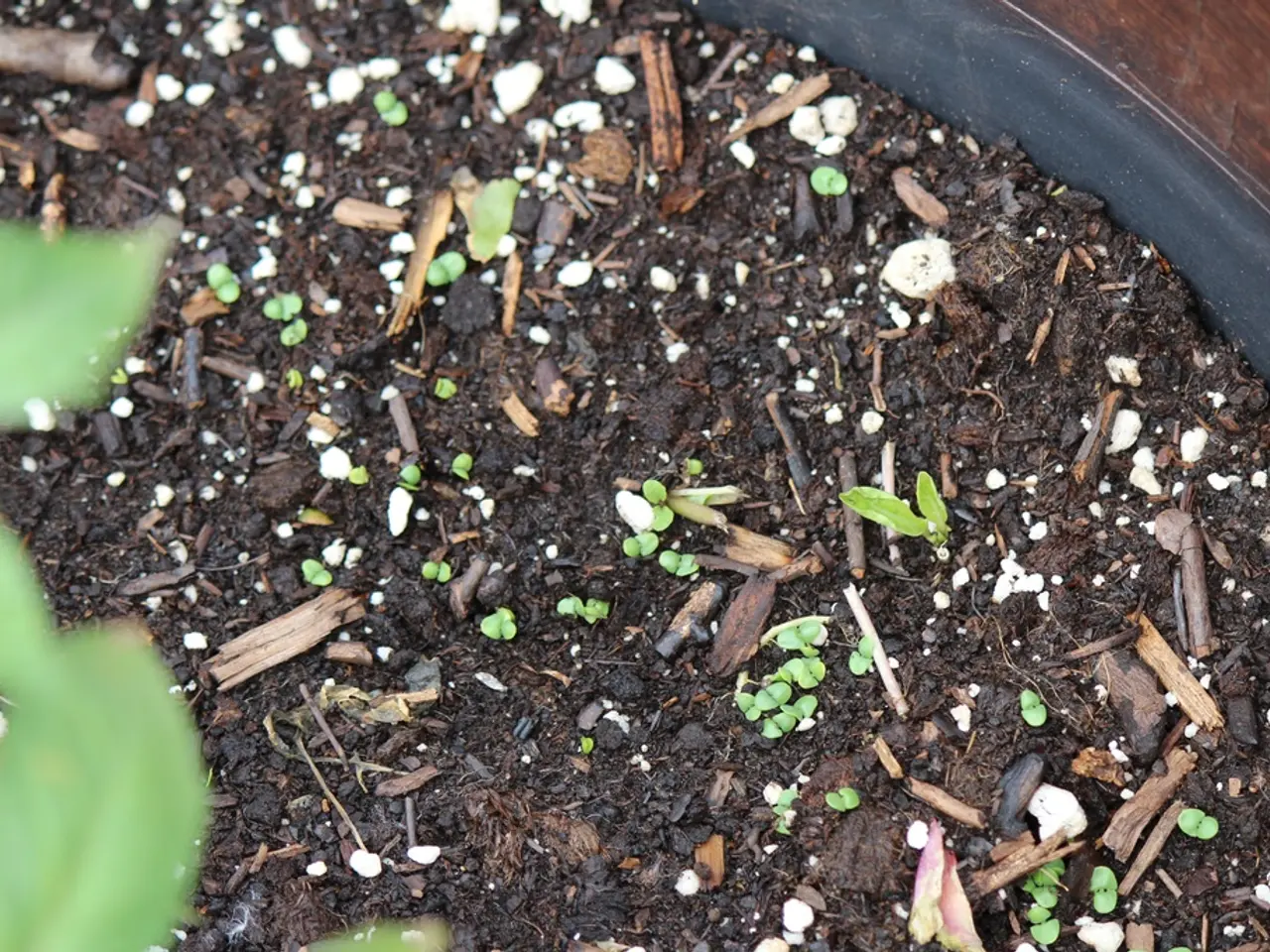Struggling Gardens Could Potentially Be Due to Pesticide Use
In the world of gardening and agriculture, pesticides have long been a tool used to combat pests and protect crops. However, recent studies have shed light on the potential long-term effects of these chemicals, revealing both human health risks and environmental harm.
Firstly, the use of pesticides can destroy beneficial soil microorganisms, such as fungi that help plants absorb essential nutrients like phosphorus and water. This disruption can lead to nutrient deficiencies in plants, affecting their growth and yield.
Young seedlings are particularly sensitive to pesticides. Traces of leftover pesticide can inhibit root development or cause abnormal growth, potentially weakening the plants from the start.
Pesticides can also interfere with seed germination and early plant growth, reducing germination rates in lettuce by up to 50%. Moreover, pesticides can damage leaf tissues, leading to dull, misshapen, or spotted leaves that can't photosynthesize effectively.
One of the most concerning aspects of pesticide use is the development of pesticide-resistant pests. This phenomenon makes pests harder to kill, forcing farmers and gardeners to apply stronger and more frequent doses.
Overuse of pesticides can also allow harmful fungi like Fusarium and Pythium, common causes of root rot, to dominate in the soil. These fungi can wreak havoc on crops, further reducing yields.
Pesticides can wash off plants and soil, contaminating nearby rivers, lakes, and groundwater. This contamination can have far-reaching effects, affecting wildlife and ecosystems.
From a human health perspective, exposure to pesticides has been linked to serious issues such as reproductive health problems, neurological damage, and cancer risk. Exposure to certain pesticides, including persistent organic pollutants like chlordane and PCBs, increases risks of endometriosis, premature ovarian insufficiency, early menopause, and fertility problems by disrupting hormone function and promoting inflammation.
Landmark research shows that pesticide exposure during pregnancy can cause brain damage in offspring, impairing cognitive abilities and motor skills due to inflammation and oxidative stress on neurons. Long-term exposure, particularly among farmworkers, has been associated with an increased risk of cancer and other chronic diseases.
From an environmental standpoint, pesticides cause non-target harm by drifting and volatilizing into surrounding ecosystems, affecting wildlife and contaminating soil and water. The destruction of beneficial insects like pollinators threatens biodiversity and crop productivity. Over time, pests develop resistance, requiring stronger or novel chemicals and perpetuating a cycle of increased pesticide use and environmental impact.
Modern farming is moving toward more responsible and precise pesticide use, using technology like AI and drones to minimize unnecessary application and environmental harm. However, challenges remain, and many environmentalists and journals continue to push for better control and a deeper look into the potential side effects of pesticides.
In conclusion, the long-term effects of using pesticides in a garden or farm encompass a complex mix of human health risks, environmental damage, and evolving agricultural challenges. A more holistic approach, such as companion planting, introducing natural predators, and using integrated pest management, may offer a more sustainable and effective solution.
[1] Xiang, Y., et al. (2019). Organochlorine pesticides exposure and the risk of endometriosis: A systematic review and meta-analysis. Environmental Health Perspectives, 127(1), 116983.
[2] Carpenter, S. R., et al. (2011). Ecological risks from pesticides in the United States: A retrospective analysis. Proceedings of the National Academy of Sciences, 108(38), 15739-15744.
[3] Grandjean, P., et al. (2018). Developmental neurotoxicity of pesticides in children. The Lancet Neurology, 17(12), 1098-1108.
[4] National Research Council. (2012). Sustainability of biotechnology for food production. Washington, DC: The National Academies Press.
[5] Klümper, W., & Qaim, A. (2014). Impact of genetically modified crops on crop yields in developing countries: A meta-analysis of 196 studies. Proceedings of the National Academy of Sciences, 111(46), 16763-16768.
- To promote healthier plants and soil, one may consider organic gardening, which avoids the use of synthetic pesticides and instead focuses on planting diverse flowers and vegetables, improving soil fertility, and attracting beneficial insects as pollinators.
- In a home-and-garden setup, one can utilize decorative elements like stone borders, wooden boxes, or clay pots for planting, thus creating a harmonious blend of functionality and aesthetics.
- The artful arrangement of flowers, vegetables, and herbs in a garden not only enhances its appeal but also practices the principle of companion planting, which encourages plant growth and deters pests in a more natural way.
- Unlike synthetic pesticides, organic methods, such as introducing beneficial insects or applying fauna-based pesticides, pose minimal risks to soil microorganisms and environmental-science diversity while effectively managing pests.
- Science advances in climate-change research indicate that cultivation practices shifting towards regenerative agriculture, powered by environmental-science insights, can better equip farming communities to combat climate-change challenges and bolster long-term food security.
- A sustainable lifestyle, promoting the use of organic seeds and avoiding the overuse of chemicals, contributes to a greener environment, aiding in the prevention of pollutants from reaching surrounding water bodies and harming aquatic life.
- The non-profit organization, dedicated to promoting home-and-garden practices and gardening education, has launched an initiative to train gardeners on utilizing integrated pest management techniques that reduce the reliance on chemical pesticides and favor native plant species.
- Ultimately, addressing the adverse consequences of pesticide use in gardens and agriculture necessitates continuous collaboration among organizations, scientists, farmers, and consumers to recognize the benefits of an organic, holistic approach in fostering a healthy ecosystem, mitigating climate change, and supporting a sustainable lifestyle.




